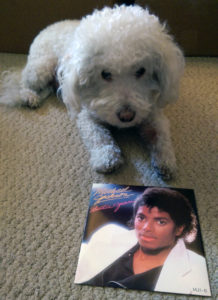Duets. Twenty of ’em.
Happy Valentine’s Day!
Click here to like Tunes du Jour on Facebook!
Follow me on Twitter: @tunesdujour
Follow me on Instagram: @glennschwartz
Duets. Twenty of ’em.
Happy Valentine’s Day!
Click here to like Tunes du Jour on Facebook!
Follow me on Twitter: @tunesdujour
Follow me on Instagram: @glennschwartz

MTV debuted on August 1, 1981. Back then it was a music video network. It positioned itself as a rock station. Most of the videos shown were of songs made by Caucasian performers, though rock-leaning black acts such as Joan Armatrading and the Bus Boys got some play.
Then came “Billie Jean.” The second single from Michael Jackson’s Thriller, “Billie Jean” was accompanied by a stylish video featuring a mesmerizing performance from Jackson. However, it wasn’t a rock song. It didn’t fit the format of rock radio stations, and it didn’t fit the format of MTV either.
But there is a big difference between radio and music television. There were plenty of radio stations and many different formats. You may not hear “Billie Jean” on the rock stations, but you could hear it on r&b stations and pop stations and dance-leaning stations. However, there was only one music television – MTV.
In his autobiography, Howling at the Moon, Walter Yetnikoff, head of CBS Records, for whom Jackson recorded (and where I worked in my first music business job), wrote “I screamed bloody murder when MTV refused to air [Jackson’s] videos. They argued that their format, white rock, excluded Michael’s music. I argued they were racist assholes – and I’d trumpet it to the world if they didn’t relent. I’ve never been more forceful or obnoxious. I’ve also never been as effective, threatening to pull all our videos. With added pressure from [Thriller producer] Quincy Jones, they caved in, and in doing so the MTV color line came crashing down.”
Jackson’s video for “Billie Jean” aired on MTV, followed just weeks later by his video for “Beat It,” a song whose guitar solo from Eddie Van Halen helped make it a hit on rock radio. These two videos made Jackson, already a superstar, a worldwide phenomenon with a humongous fan base that transcended race, age and location in a way never seen before. These two videos made MTV, a year and a half old and fairly popular in white suburban areas, a cultural institution. These two videos made the music video, then not something done for many singles, particularly those performed by artists of color, an art form and a necessary marketing tool.
Some people tuned in to MTV to see the Michael Jackson videos, and while watching the channel, discovered other acts. Some people tuned in to MTV to watch “white rock” videos, and while watching the channel, discovered Michael Jackson.
MTV went to showcase more “non-rock” videos. In 1988, they launched their hugely popular program Yo! MTV Raps, something that would have been completely unexpected just five years earlier, pre-“Billie Jean.”
While MTV deserves credit for making “Billie Jean” and Thriller successful, the person most responsible is Jackson himself. He wrote the song. He sang the song. He danced the song. Quincy Jones did not want “Billie Jean” to appear on Thriller. He didn’t like the title. He didn’t like the bassline. He felt the song’s introduction was too long. Jackson argued “But that’s the jelly!…That’s what makes me want to dance.” Jones wasn’t ready for this jelly, but Jackson stood his ground.
In May of 1983, NBC aired a tribute to Motown Records. Motown: Yesterday, Today, Forever featuring many legends who recorded for the storied label performing their classics. We saw Diana Ross, the Temptations, Marvin Gaye, Smokey Robinson and the Miracles, Stevie Wonder, the Four Tops, Martha Reeves, Lionel Richie and the Commodores, Mary Wells, Junior Walker and then some. It was a terrific show, but the talk of the town following its airing was the performance of a song not from the Motown catalogue – Michael Jackson’s “Billie Jean.” The iconic performance, during which Jackson brought the famous moonwalk to the world at large, pushed him that much more ahead of any other performer working in music back then.
Following “Beat It,” CBS Records released four more singles from Thriller. All seven of the singles released (the album had only nine songs!) went top ten, breaking the record of most top ten hits from a single-artist album that was set a few years earlier by…Michael Jackson, whose Off the Wall gave us four. Before Thriller, four singles for one album was considered a lot. Thriller raised the bar for blockbuster albums, and subsequent releases such as Bruce Springsteen’s Born in the U.S.A., Prince’s Purple Rain, Def Leppard’s Hysteria and Janet Jackson’s Control each produced more than four hits.
“Billie Jean” changed everything.
On this week’s Throwback Thursday playlist, Tunes du Jour spotlights 1983, kicking off with Michael Jackson’s classic “Billie Jean.”
Click here to like Tunes du Jour on Facebook!
Follow me on Twitter: @TunesDuJour
As a songwriter, Gloria Jones charted with Gladys Knight & the Pips’ “If I Were Your Woman,” the Four Tops’ “Just Seven Numbers (Can Straighten Out My Life),” and Marvin Gaye and Diana Ross’ “My Mistake (Was to Love You).” As a producer, Gloria Jones hit the top ten on the disco chart with Gonzalez’s “Haven’t Stopped Dancing Yet.” But as a lead singer, Jones failed to make the pop, r&b or dance charts.
In 1973, while on a trip to the United States, British DJ Richard Searling purchased a copy of a Gloria Jones single from 1965. The A-side was a song called “My Bad Boy’s Comin’ Home,” but it was the B-side that really got Searling’s attention.
Northern soul music (uptempo American soul music in a sixties Motown vein yet without commercial success) had a large cult following in the northern England at that time, and Searling played the Gloria Jones b-side during his sets.
Northern soul fan David Ball loved the song. When he and his musical partner, Mark Almond, who together comprised the duo Soft Cell, were looking for a song to cover, they went with the Jones song, thinking it would be interesting for a synth band to cover a soul tune. Their record label asked them to add guitar, bass and drums to the track, but the duo refused. Despite this, the label put out the singer. Almond told Rolling Stone magazine “We thought if we were really lucky, we’d scrape into the top 75 in Britain. We didn’t think anything would happen over here [in the US].”
Soft Cell’s recording of “Tainted Love” became a smash worldwide. In the US, it spent 43 weeks on Billboard’s Hot 100, a record at that time. Said Gloria Jones of the Soft Cell recording “Their version was far better than mine.”

This week, Tunes du Jour celebrates Throwback Thursday with twenty great tunes from 1982, kicking off with Soft Cell’s version of “Tainted Love,” but first, check out Gloria Jones’ original:
Click here to like Tunes du Jour on Facebook!
Follow me on Twitter: @TunesDuJour
An instrumental performed by then new Eagles member Don Felder was submitted to his bandmates Glenn Frey and Don Henley to add lyrics. The first working title the guys gave the song was “Mexican Reggae.”
Henley was determined to create the perfect song, spending eight months in the studio working on “Mexican Reggae,” which came to be called “Hotel California.” A lyric referring to the band Steely Dan was added (“They stab it with their steely knives but they just can’t kill the beast”) after Steely Dan included the lyric “Turn up the Eagles, the neighbors are listening” on their song “Everything You Did.”
In 2009, music critic John Soeder asked Don Henley about the lyric “So I called up the Captain / ‘Please bring me my wine’ / He said, ‘We haven’t had that spirit here since 1969’,” pointing out that wine isn’t a spirit, as wine is fermented whereas spirits are distilled. Soeder asked the singer/composer “Do you regret that lyric?” Henley replied “Believe me, I’ve consumed enough alcoholic beverages in my time to know how they are made and what the proper nomenclature is….My only regret would be having to explain it in detail to you, which would defeat the purpose of using literary devices in songwriting and lower the discussion to some silly and irrelevant argument about chemical processes.” Insert steely knife here!
This week for Throwback Thursday, Tunes du Jour listens to the hits of 1977, kicking off with Eagles’ “Hotel California.”
Click here to like Tunes du Jour on Facebook!
Follow me on Twitter: @TunesDuJour

Today is the birthday of Natalie Merchant, former lead singer of 10,000 Maniacs, whose 1987 album In My Tribe is one of my favorites. The album opens with “What’s the Matter Here,” a song that addresses child abuse. That inspired the theme of today’s playlist – songs about social or political issues.
While such recordings seemed more commonplace on the radio in the sixties and early seventies, there remain plenty of songs that speak to topical issues. I decided to make 1980 my starting point, with that year’s “Biko” by Peter Gabriel being the oldest song on the list. As the studio version is not on Spotify I used a live recording. The most recent recording included is Lady Gaga’s “Born This Way,” from 2011. Lots of great songs of different genres about a variety of topics populate the program. If you’re so inclined, let me know what favorites of yours I missed.
Click here to like Tunes du Jour on Facebook!
Sometimes an awkward lyric shows up and mars an otherwise perfectly reasonable song. I don’t mean songs such as Paul McCartney’s “Spies Like Us” or Stevie Wonder’s “I Just Called to Say I Love You” or Paul McCartney and Stevie Wonder’s “Ebony and Ivory.” Those songs are just plain bad.
Wings’ “Live and Let Die” is one of my favorite of Sir Paul’s post-Beatles songs, but I refuse to sing along with the phrase “this ever changing world in which we live in.” Poor grammar makes me want to give in and cry.
John Mellencamp’s “R.O.C.K. in the U.S.A.” pays tribute to many rock and soul greats of the 1960s. It’s a crackin’ little number but I always cringe when he sings “let’s don’t forget James Brown.” “Let’s not” uses just as many syllables, is grammatically-correct, and doesn’t detract from the message of not forgetting James Brown.
There are times when lyrics are bad not because of their grammar, but because they sound like place holders that remained in the song because the lyricist couldn’t come up with anything with which to replace them. Take Elton John’s classic hit “Your Song.” “If I was a sculptor, but then again, no.” Why is that in the song? You’re not a sculptor. You weren’t a sculptor. What would happen if you were a sculptor? Instead of giving the object of your affection the gift of song, would you make a bust of their face, a la Lionel Richie’s “Hello” video?
One of my favorite bad lyrics is in the Diana Ross and the Supremes hit “I’m Livin’ in Shame,” in which Diana sings “Came the telegram – Ma passed away while making homemade jam.” Telegram messages were charged by the letter, so including the details of what Ma was doing when she died is a bad choice lyrically and financially. What lyrics were discarded in favor of that? “Came the telegram – Ma passed away while carving up the ham?” “Came the telegram – Ma passed away with her finger in a dam?” “Came the telegram – Ma passed away serving in Viet Nam?” “Came the telegram – Ma passed away from an attack by a ram?” “Came the telegram – Ma passed away from choking on a yam?” That last one is good, but then again, no.
“I Started a Joke” by the Bee Gees is an okay song that would be better if Johnny Marr played guitar on it. Then it may sound like a Smiths song. Not a Smiths single. Maybe an album track. I’m not sure what the over-the-top lyrics are about. It seems Robin Gibb is not a gifted comedian and his joke made everyone cry and then he cried and everyone started laughing and then he died but kept singing this song. That’s all well and good. The line that made me include it in this blog entry is “I fell out of bed hurting my head from things that I said.” I think you hurt your head when you fell out of bed and banged said head on a jar of homemade jam.
Let’s don’t forget Robin and Maurice Gibb on their birthday.
Today’s playlist is made up of songs that were at #1 in Glenn’s Ten on this day, in chronological order. A few of the songs are not on Spotify, so I’ll give you YouTube links so you may experience them.
Originally intended to be the b-side of a George Harrison single entitled “This Is Love,” supergroup Traveling Wilburys’ “Handle With Care” was my #1 on this day on 1988. Per the liner notes of this album’s reissue in 2007, the word “wilbury” came from a remark George Harrison made to producer Jeff Lynne about errors made while recording – “We’ll bury ’em in the mix.”
Despite referencing Santa in its title and being a December #1 in 1991, De La Soul’s “Millie Pulled a Pistol on Santa” in not a Christmas song. It’s about a girl seeking revenge on a sexually-abusive parent.
“I Got My Education” performed by New York house duo Uncanny Alliance was my #1 this day in 1992. It hit #2 on Billboard‘s dance chart. The duo released one album and neither member was ever heard from again.
My #1 on this day in 2005 was The White Stripes’ “Walking with a Ghost,” a cover of a song released just a few months earlier by Tegan and Sara.
Here are the other #1s from this day in Glenn’s Ten history, except for 1985’s entry, as I cannot locate the book where I maintained that year’s lists.